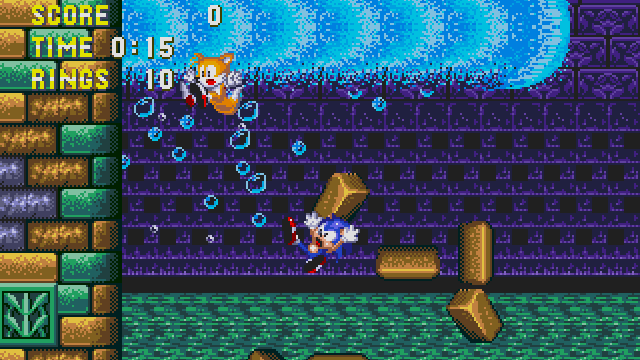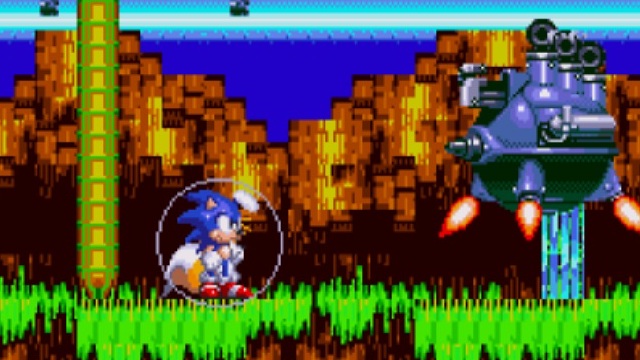One of the strangest pairings in gaming history is the completely uncredited involvement of Michael Jackson for the soundtrack of Sonic the Hedgehog 3. While the late “King of Pop” can no longer clear the air and discuss his involvement, several key figures involved with the beloved platformer have come forward over the years to make this video game myth become more accepted fact than fiction. However, there is still plenty of confusion and debate as to what the “You Rock My World” singer really contributed to the soundtrack as Sega has never commented on the collaboration in an official manner.
The first to publicly talk about Jackson’s involvement was Sega Technical Institute director Roger Hector, who oversaw the platformer’s development. In 2005, he said that the company, who already had a working relationship with Jackson due to its development of the Michael Jackson’s Moonwalker arcade and console games, brought in the pop star after he had expressed being a fan of the Sonic series. Having a world-renowned artist on staff was a huge get for the heavily anticipated sequel and such involvement would have normally been advertised, which is why many initially discarded the rumors of Jackson working on the game without a second thought.
In the decade since then, several other key figures have spoken about the collaboration from both sides. Credited composers Cirocco Jones and frequent Jackson collaborator Brad Buxer have both been open about Jackson being involved with the soundtrack for Sonic the Hedgehog 3. Meanwhile, Sonic co-creator Naoto Ohshima revealed in a 2013 interview that Jackson sent an a cappella demo tape to the development team, which featured the singer’s signature beatboxing and eccentric vocal effects, and that Sega likely still has a copy of it. This revelation was echoed by Hector, who added that many samples were made from the recording.
Similarities to Jackson’s work

While many of the first-hand accounts are frustratingly vague about Jackson’s involvement in Sonic the Hedgehog 3, actually examining the finished product and the musical catalog of the “King of Pop” produces some concrete evidence that is hard for even the biggest skeptic to ignore. One of the most obvious examples comes from the theme that plays whenever Knuckles appears on-screen. It’s just a short four-bar beat, but it should sound instantly familiar to anyone that is familiar with his 1997 hit single, “Blood on the Dance Floor.” While the released song features a poppier instrumental compared to the bass-heavy tune produced by the Genesis’ hardware, the near-identical beat structure is undeniable.
Meanwhile, some of the best songs on the soundtrack, the two acts of Carnival Night Zone, sound similar to Jackson’s 1991 hit “Jam” off of his fourth album, Dangerous. In particular, an identical horn section, which appears before Heavy D’s short rap verse in the Jackson song, can be heard in both. While it’s possible that a Sega composer was a fan and interpolated his song for the soundtrack, it seems more likely that Jackson just reused one of his own ideas given all of the evidence of his involvement.
The other major evidence that Jackson worked on the soundtrack can be found in Sonic the Hedgehog 3‘s credits theme. Upon first listen, it sounds surprisingly similar to a sped-up version of Jackson’s “Stranger in Moscow,” which wouldn’t be released until 1996. If slowed down, the similarities are even more pronounced, and an identical synth section can be heard early on in both. Considering both “Blood on the Dance Floor” and “Stranger in Moscow” released after the platformer, it becomes clear that Jackson was using Sonic the Hedgehog 3 to test ideas he would later use in some of his own work.
Why Michael Jackson is uncredited

As mentioned previously, one of the biggest question marks surrounding the game is why Sega wouldn’t advertise Michael Jackson’s involvement. After all, the singer-songwriter has a gigantic fanbase and it would help move even more copies of the Genesis title. The reasoning seems to be due to a mixture of reasons that benefited both sides. According to Hector, Sega wanted to distance themselves from the pop star after Evan Chandler accused Jackson of sexually abusing his 13-year-old son.
The allegations, which were settled in January 1994 via a $23 million settlement, caused Jackson to cancel a leg of his Dangerous World Tour and lose lucrative endorsement deals with the likes of Pepsi. In 2009, Buxer said in an interview with French magazine Black and White that Jackson was unhappy with the sound capabilities of the Sega Genesis, and that he chose to be uncredited since he “did not want to be associated with a product that devalued his music.” With Sega not wanting bad publicity, and Jackson not thrilled with the overall work, it made sense for both sides to avoid crediting the singer.
Another element that points towards Jackson’s involvement is how rarely Sonic titles have used music from the third entry and how the music has been changed in some of the ports of the platformer. One key case is the 1997 PC port of the game, which replaced six different tracks of music from the Genesis version with different compositions. These included the three tracks mentioned above plus IceCap, Launch Base, and the Competition music menu.
However, future compilations, such as 2009’s Sonic’s Ultimate Genesis Collection, have used the regular songs, so a deal may have been made to allow the music to be used in re-releases at some point. It is also worth noting that despite releasing nostalgia-based games such as Sonic Generations and Sonic Mania, none of the levels or music that allegedly featured Jackson are used in them.
Considering the testimony of key staff members and some of Jackson’s musical collaborators, it’s pretty clear that he did work on Sonic the Hedgehog 3. While the exact contributions are still somewhat murky, we at least know that several of the tracks were later reworked by the artist for his own career. It’s certainly cool to know that one of gaming’s biggest myths actually has a factual basis, even if he didn’t compose the entire game’s music.







